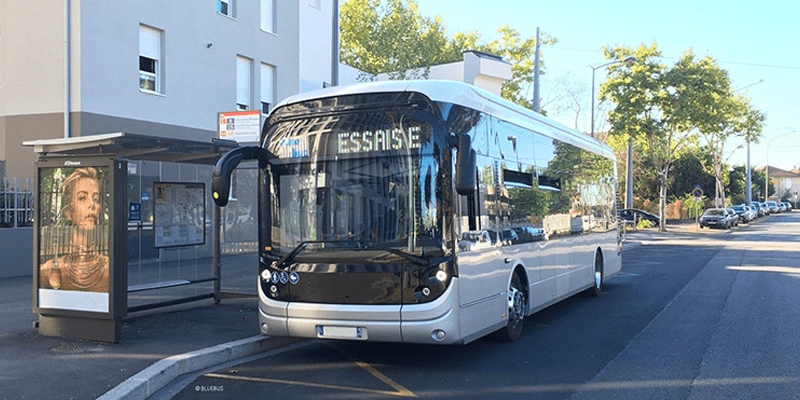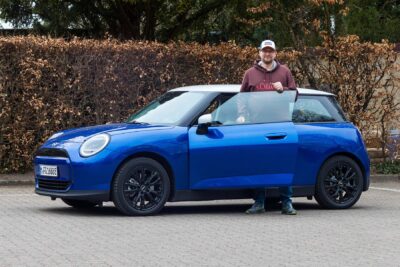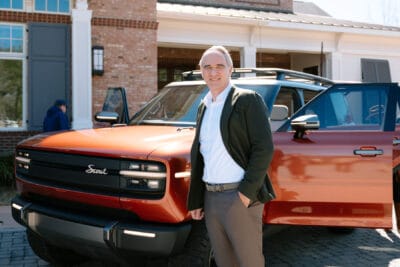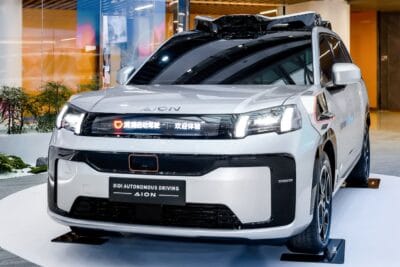Paris public transport operator orders 109 electric buses by Bluebus
The French electric bus manufacturer Bluebus, part of the Bolloré Group, has announced two orders from the public transport operator RATP for a total of 109 electric buses for the Ile-de-France region, as the Paris conurbation is called. One special feature here is that the buses have solid-state batteries on board.
Specifically, the two new orders involve the delivery of 44 and 65 electric buses, respectively, with a length of twelve meters. The 109 new vehicles complement 50 electric buses that the RATP had ordered from Bluebus in 2019 and which are still scheduled for delivery in the first quarter of 2021. In total, the public transport operator will therefore use 159 electric Bluebus vehicles in the future.
The background to the new orders is the RATP’s ambitious “Bus2025” roadmap, which envisages the procurement of up to 800 electric buses by 2024. The budget of 400 million euros earmarked for this will go to the manufacturers Heuliez Bus, Bolloré and Alstom in equal shares of 133 million euros each. The mega-project is being financed by Île-de-France Mobilités, the organization responsible for organizing public transport in the Paris metropolitan area. In October, the EU pledged a grant of 23 million euros. The amount will be used for the purchase of buses, but also for the conversion of 25 bus depots.
The first order for 150 vehicles has been placed with the trio of manufacturers in 2019. In addition to the aforementioned 50 Bluebus vehicles, RATP will also take delivery of 50 units of Alstom’s Aptis buses and as many of Heuliez Bus. In addition, there are now further rounds of orders as part of “Bus2025”. In addition to the two new orders placed with Bluebus for the aforementioned 109 electric buses, Heuliez, for example, announced in October 2020 that “200 electric buses are being prepared for delivery to RATP.” Nothing is yet known about specific follow-up orders to Alstom.
Meanwhile, 36 units of the Heuliez GX 337 ELEC and 89 examples of the twelve-meter Bluebus have already gone to the Paris public transport operator from previous orders (outside the 800-electric bus tender). The total number of electric buses at RATP as of October amounts to 150 units.
The company currently has 4,700 buses in operation, including around 1,000 hybrid buses, 250 biogas buses and 3,300 diesel buses in addition to the 150 electric buses. The target is to have around 2,200 biogas buses and 1,500 electric buses by 2025 in addition to the 1,000 hybrid buses. Speaking to Le Monde newspaper in October, Catherine Guillouard, president and CEO of RATP, said that against this backdrop, a second mega-tender for 2,100 buses, including 1,400 biogas and 700 electric buses, worth up to €1.4 billion was currently being prepared.
In parallel with the RATP business area, the Ile-de-France region, as the region surrounding Paris is known, is also planning the complete conversion of its bus fleet to biogas and electric drive. The fleet currently comprises 10,300 buses, including 8,700 diesel buses. By 2030, it is to comprise 70 per cent biogas and 30 per cent electric buses. The investment is expected to amount to around four billion euros. Here, too, Ile-de-France Mobilités is responsible for financing.
Solid-state batteries manufactured in-house by Blue Solutions
So much for the ambitious electrification plans of the French capital region. Let’s come back to the Bolloré subsidiary Bluebus. Founded in 2007 in Ergué-Gabéric in Brittany, France, the company has two buses in its portfolio: a six-meter and a twelve-meter electric model. Both are available exclusively with solid-state batteries. The batteries with lithium metal polymer (LMP batteries for short) were developed by another Bolloré subsidiary, Blue Solutions, and also roll off the production line in Brittany. They are nickel- and cobalt-free and, according to the developer, can be operated at outside temperatures of up to 65 degrees Celsius without cooling.
According to Bluebus, 400 electric buses have already been delivered worldwide. The twelve-meter bus version now ordered by RATP has six battery packs with a total capacity of 378 kWh, allowing a range of up to 320 kilometers, according to the manufacturer. The vehicle has a continuous output of 160 kW, a peak output of 230 kW, a top speed of 70 kph and can carry 109 passengers. Incidentally, the Bolloré subsidiaries have been working with French specialty vehicle manufacturer Gaussin since 2018 to integrate the solid-state batteries.
Bolloré claims to have invested more than 20 years of research and development in the solid-state battery. Bluebus’ 12-meter buses could be equipped with a maximum of seven battery packs, adding up to an energy storage capacity of 441 kWh. Daimler also quotes this capacity for its eCitaro with solid-state battery. The reason is simple. Daimler sources the LMP batteries from Blue Solutions. Avere France, among others, reported on the cooperation between the two companies in summer 2018. In July 2020, the two-year partnership also led to a three-year battery supply contract including an option to extend it by a further two years.
With reporting by Cora Werwitzke, France.
sustainable-bus.com, abp.bzh (press release, PDF), leparisien.fr (support from the EU), challenges.fr (Heuliez), lemonde.fr (electric fleet plans by RATP and Ile-de-France), tradingsat.com (cooperation with Gaussin)





0 Comments